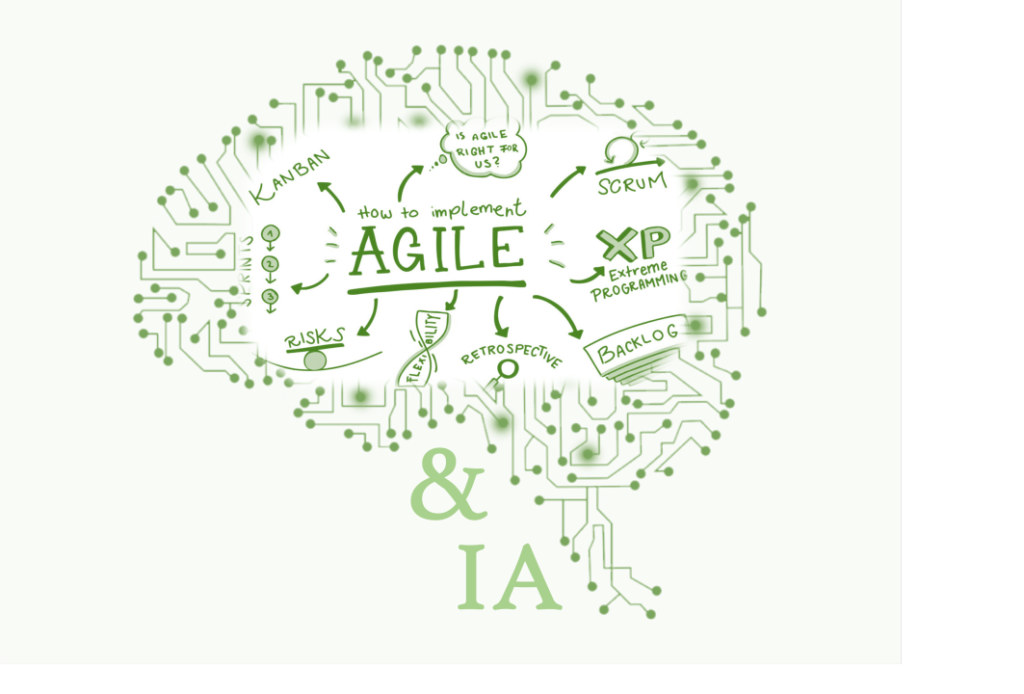Two case studies of Agile teams using AI
Case Study 1: A revolution in video game development thanks to Artificial Intelligence
In the competitive world of video game development, a pioneering company was facing crucial challenges related to quality testing and bug identification, hampering launches and damaging the User experience. To overcome these difficulties, it took the bold step of adopting artificial intelligence (AI) into its creative processes.
The main challenge was to revolutionize testing methods to speed up bug detection and improve game quality. The ambition was clear: to detect and resolve problems proactively, thereby avoiding their impact on players’ enjoyment of the game.
The innovation took the form of a bespoke AI system, capable of continuously analyzing source code and game data to spot problematic patterns, and using predictive analysis to identify issues before they lead to major bugs. The system also facilitates the integration of automated tests into the development workflow, minimizing the need for manual testing and boosting the creative cycle. It also provides precise reports on risks and possible improvements, guiding developers towards the necessary adjustments.
The implementation of this technology transformed the development cycle. Training sessions enabled teams to master the interpretation of AI analyses and the application of its recommendations. The results have been spectacular: test cycles have been shortened, enabling more frequent updates and a significant improvement in the quality of games, which has boosted customer satisfaction and confidence. What’s more, this renewed efficiency has enabled resources to be better allocated, encouraging innovation and enriching the gaming experience.
Lessons learned: The integration of AI became a pivotal moment for the company, transforming its approach to testing and bug detection.
This example demonstrates AI’s immense potential within the game development industry, showcasing its ability to offer innovative solutions for complex challenges and significantly improve both the quality and the user experience.
Case Study 2: Transforming communication through AI
A company at the forefront of developing personalized web solutions was experiencing communication barriers, both within its agile teams and with its customers. Misunderstandings and response times were affecting productivity and customer satisfaction. To remedy these problems, the company chose to take advantage of artificial intelligence to enhance its internal and external communication.
The challenge was twofold: to improve the fluidity of exchanges within teams and with customers, while ensuring accurate, consistent and timely communications. The secondary objective was to refine our understanding of customers’ needs and expectations through their feedback.
To meet these challenges, the company launched an AI solution that would:
- Review internal communications to identify and resolve any misunderstandings or conflicts.
- Make team meetings and sprint reviews more effective with automatic summaries and clearly defined action items.
- Analyze customer feedback to identify trends and concerns, enabling a rapid and appropriate response.
- Optimize the drafting of customer communications by using natural language processing to ensure clear, professional and personalized messages.
The implementation of the solution was seamlessly integrated into the company’s day-to-day operations. The teams and project managers were trained in the use of this tool and in the principles of effective communication.
The results have been remarkable:
- Improved internal communication: Misunderstandings have been significantly reduced, fostering greater cohesion and alignment on project objectives.
- Enhanced Customer Engagement: Analysis of customer interactions has enabled rapid identification and resolution of concerns, boosting customer satisfaction. AI has also improved the clarity of external communications.
- Increased productivity: Clarifying exchanges has optimized time management and boosted team productivity.
- Increased satisfaction: The improved quality of communication has enhanced the experience and satisfaction of both customers and employees.
Lessons learned: The company’s integration of AI has showcased its transformative power in enhancing both internal and external communications.
This AI-driven approach has clarified conversations and provided deep insights into customer feedback, addressing communication barriers, elevating satisfaction levels among customers and staff, and increasing operational efficiency. The case study emphasizes AI’s vital role in refining communication strategies for agile organizations, promoting stronger teamwork, and engaging customers more effectively.
To find out more
In “Role of Artificial Intelligence on Agile Planning and Organizational Performance in the ICT Industry” (Asian Journal of Economics, Finance and Management), Dr. Farhang S. examines how the integration of Artificial Intelligence (AI) with agile methodologies is impacting the Information and Communication Technology (ICT) industry. Key points include :
- Potential of AI in project management: AI is presented as a transformative vector in project management, capable of automating tasks, predicting risks, and facilitating planning and decision-making.
- Improvements in agile planning: The study explains how AI can improve agile planning, making it more efficient and better adapted to changing requirements and customer feedback.
- Impact on organizational performance: The paper highlights the significant benefits that AI integration can bring to organizational performance in the ICT industry, particularly in terms of increased productivity and project success rates.
- Challenges and opportunities: While highlighting the benefits, the paper also discusses the challenges and complexities of integrating AI into agile practices.
- Future directions: The conclusion highlights the continued adoption of agile methodologies, enhanced by AI, to drive productivity and organizational performance, and highlights the need for further understanding and research in this area.
Article written by Esteban MARTINEZ QUEROL
